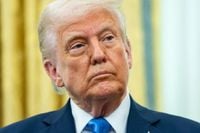Former President Donald Trump has called on Federal Reserve Chairman Jerome Powell to lower interest rates, claiming that current economic conditions make it an ideal time for such a move. In a post on his social media platform, Truth Social, Trump pointed out that energy prices, interest rates, and inflation are all on the decline, with egg prices having dropped by an astonishing 69%. He also highlighted recent employment gains, describing them as a significant victory for the American economy.
Trump's comments come at a time when the stock market is experiencing significant declines, raising concerns among investors. The Dow Jones Industrial Average fell by over 1,400 points on Friday, following a staggering drop of 1,679 points the previous day. The S&P 500 also saw a 4% decline, which followed a 4.8% drop on Thursday, marking a decline of over 15% from its recent high. The NASDAQ Composite, which includes many technology companies with operations in China, has plummeted by 21% since its peak in December, officially entering a bear market.
These market downturns have been exacerbated by recent trade tensions, particularly after China announced new tariffs on U.S. goods, which has raised fears of a potential global trade war that could lead to a recession. In light of these developments, Trump reiterated his criticism of Powell’s monetary policy, suggesting that the Fed's adjustments are often too slow. He urged Powell to 'stop the political stunt' and take decisive action to cut interest rates.
On April 4, 2025, Trump emphasized, "Now is the perfect time for Chairman Powell to lower interest rates. He is always 'late,' but now he can reverse that image and act quickly." He continued, stating, "Energy prices are falling, interest rates are low, and inflation is easing. Eggs are down 69%, and employment is increasing. All happened in the last 2 months. A big win for America. The chairman should lower rates and stop the political stunt." This statement reflects Trump’s long-standing argument that low interest rates are essential for stimulating consumer demand.
Traditionally, U.S. presidents have refrained from commenting on the Federal Reserve’s policy decisions, but Trump has been vocal about his desire for lower interest rates. His pressure on the Fed has been consistent, especially in light of the recent stock market turmoil. Many economists and investors are concerned that Trump's trade policies, particularly his tariffs, may lead to a recession, given the potential for a trade war to negatively impact the global economy.
Earlier on the same day, Trump reposted a video that suggested he might be intentionally crashing financial markets as part of a broader strategy to compel Powell to implement rate cuts. This bold approach has sparked discussions about the intersection of politics and economic policy, particularly as Trump navigates his relationship with the Fed amidst significant market volatility.
As the financial landscape continues to shift, the implications of Trump's comments and the Fed's response will be closely monitored by investors, economists, and policymakers alike. The urgency of the situation is palpable, with many wondering whether the Fed will heed Trump's call for action or maintain its current course amidst the challenges posed by a volatile market and international trade tensions.
In the broader context, the economic indicators suggest a complex picture. The recent employment statistics show that the U.S. non-farm payrolls added 228,000 jobs in March, with the unemployment rate sitting at 4.2%. This data suggests some resilience in the job market, even as other indicators point to potential economic headwinds.
Additionally, the Chinese government’s announcement of a 34% additional tariff on all imports from the United States has further complicated the economic landscape. This move is seen as a retaliatory measure that could escalate trade tensions and contribute to a slowdown in economic growth not just in the U.S. but globally. The ramifications of such tariffs could extend beyond immediate market reactions, potentially leading to long-term shifts in trade relationships and economic strategies.
On April 4, 2025, the Nikkei average in Japan closed down 955 yen, reflecting the global impact of the ongoing trade disputes and market uncertainties. Long-term interest rates in Japan also fell to levels not seen in three months, indicating a broader trend of declining rates in response to economic pressures.
As the situation unfolds, the interplay between Trump's calls for lower interest rates and the Fed's policy decisions will remain a focal point for many. Investors are keenly aware that the actions taken by the Fed in the coming weeks could have significant implications for market stability and economic growth.
In summary, Trump's push for interest rate cuts amid a backdrop of declining market indices and rising trade tensions underscores the complexities of modern economic governance. As the Federal Reserve contemplates its next moves, the pressure from Trump and the realities of the market may shape a pivotal moment in U.S. economic policy.





